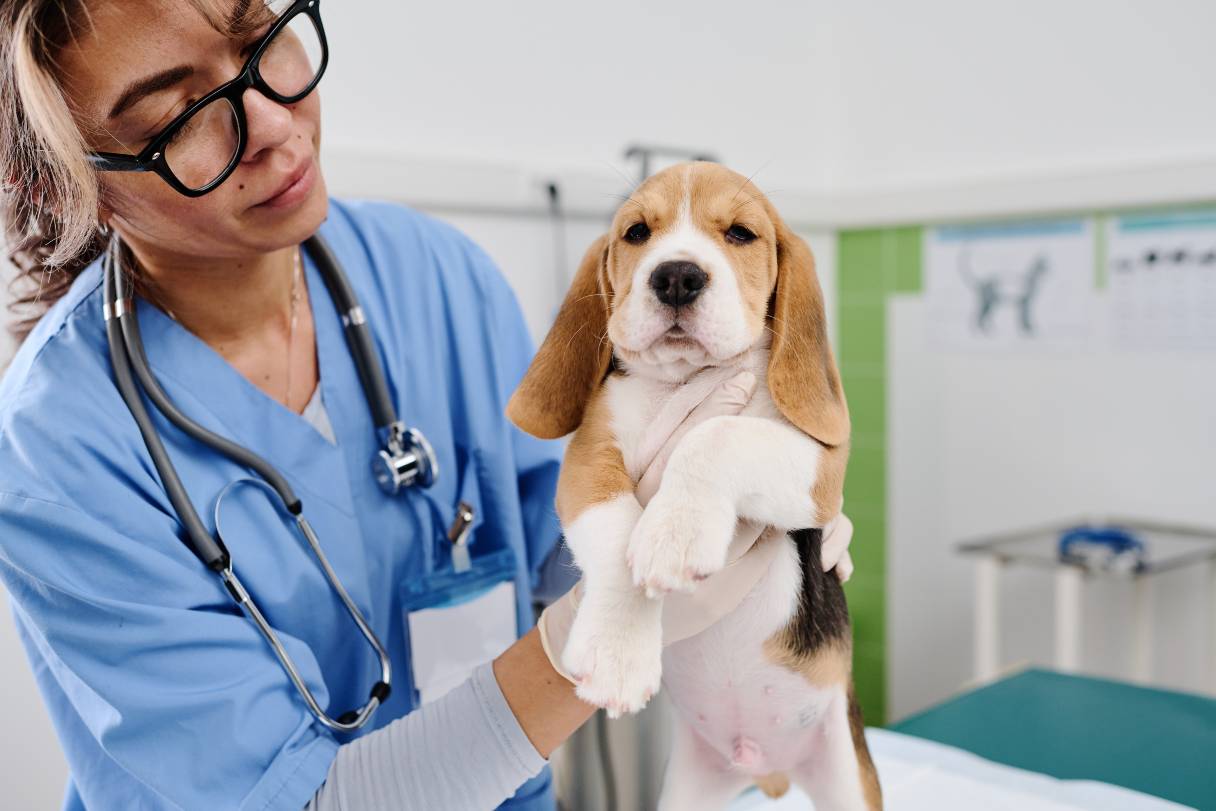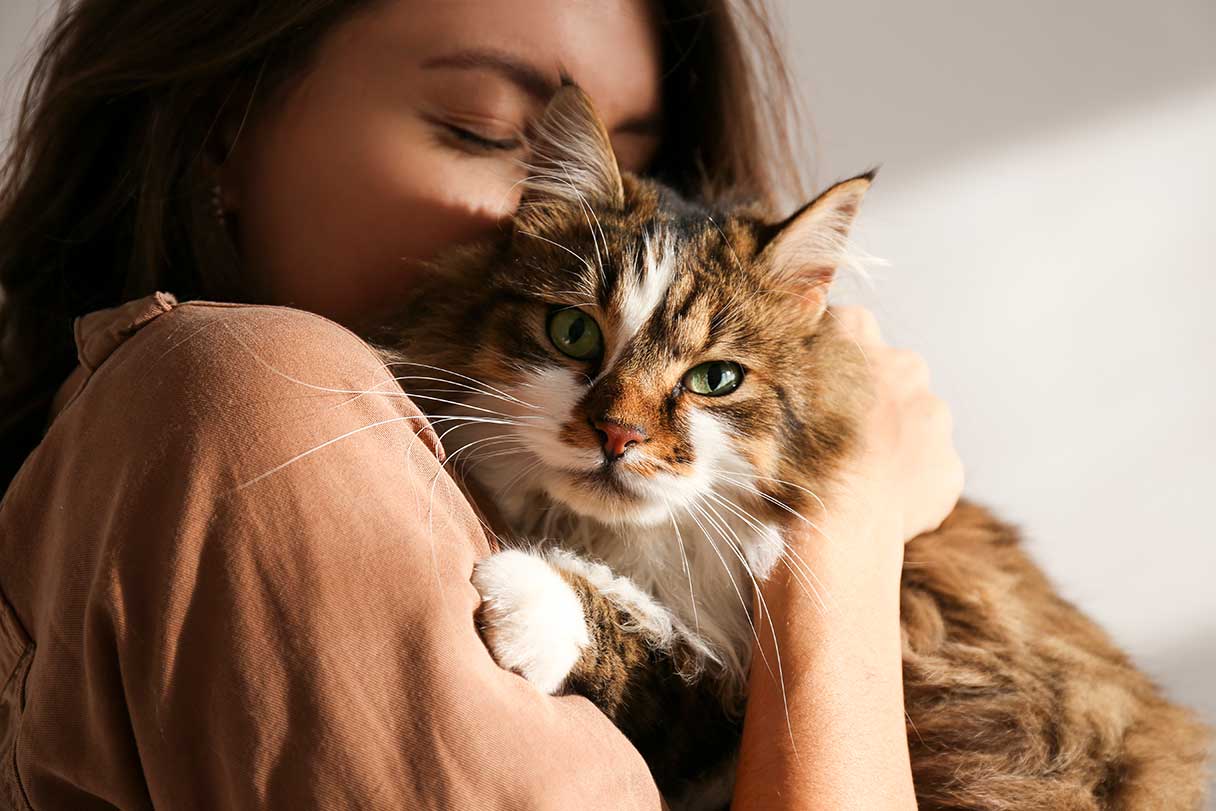Rabies is one of the deadliest viral diseases to affect mammals of all types, and has spread to every continent in the world except Antarctica. It's zoonotic, meaning it's transmissible between animals and humans, and accounts for 59,000 deaths per year, the majority of which occur in Africa and Asia.1
Sadly, dogs are the main source of human rabies infections, accounting for 99% of them, which is why vaccinating your dog is so important. Fortunately, rabies vaccination can protect your dog from infection if they encounter an infected wild animal, preventing the spread of this disease that is nearly always fatal to both humans and pets.2
How Does the Dog Rabies Vaccine Work?
The rabies vaccine dates back to 1885, when Louis Pasteur first invented it for use in humans after a rabies infection. However, starting in the 1980s, veterinarians began giving the vaccine to healthy dogs to prevent them from becoming infected with rabies in the first place.1
The rabies vaccine for dogs:1
- Is designed specifically for use in canines and contains an inactive version of the rabies virus that won't infect your dog with the disease.
- Is given as an injection by your veterinarian.
- Teaches your dog's immune system to fight off this deadly virus by triggering it to develop antibodies against the disease.
- Prevents your dog from becoming infected with rabies because the antibodies produced by their immune system stay in your dog's body over time, and will stop the virus before it can make them sick.
- Is considered part of the core vaccines recommended for all dogs, along with the canine distemper virus, canine parvovirus and canine adenovirus-2 vaccines.4
Why Is the Rabies Vaccine Important for Dogs?
The rabies vaccine is important for dogs for many reasons, mainly because rabies is a zoonotic disease that is easily spread to humans, making mandatory vaccination an issue of public safety. This vital vaccine is necessary because:1
- It not only prevents your pup from becoming infected with rabies but it also prevents the spread of rabies to humans.
- The vaccine is legally mandated for dogs by nearly all states and municipalities throughout the United States due to the danger of the disease to people.
- It has reduced the number of human rabies infections in the U.S. to three or fewer per year. That's because fewer dogs are becoming infected with rabies, meaning there is less of a chance of them passing it to humans and other mammals.
- The rabies virus nearly always results in death. Should your dog become infected with rabies, they will likely not survive the infection if they are not current on their rabies vaccination.
- Your dog will likely be euthanized by your local law enforcement if you suspect that your dog has rabies, because of the risk this disease poses to the public.
How Do Dogs Get Rabies?
Dogs get rabies when they come into contact with the saliva of an infected animal, usually a wild animal such as a raccoon, bat, skunk or fox. It's rare for a dog to get rabies from another dog because of mandatory rabies vaccinations within the United States.3
In general:3
- Transmission is typically made through a bite but could also come from a lick of an open wound or a scratch.
- Getting saliva in the eyes, mouth or nose could also transmit the disease to your dog.
- After becoming infected, the virus typically takes 21 to 80 days before symptoms will start to develop.7
- Once symptoms appear, the disease is almost always fatal and there aren't any treatments available for rabies.7
- There are around 400 to 500 reported cases of rabies in pets such as dogs, cats and ferrets each year.7
How Often Do Dogs Need Rabies Shots?
Your dog should get their first dose of the rabies vaccination when they are between 12 and 16 weeks old. This will give them the antibodies they need to fight off the disease if they should come into contact with an infected animal.3
After their initial vaccination, your dog's immunity will wane with time, so they'll need a booster shot every one to three years, depending on your state and local laws.3
How Much Is a Rabies Shot for Dogs?
The cost of a rabies vaccination varies by location, usually ranging in price from between $15 and $35.1
To get a rabies vaccination, you'll have to visit a veterinarian. While at the vet, you may also have to pay for the cost of an office visit,5 which averages around $61.6 Alternately, some low-cost veterinary clinics and animal shelters offer the rabies vaccination at no or reduced cost to pet owners.5
Does Pet Insurance Cover Dog Rabies Vaccination?
Yes, most pet insurance policies cover your dog's vaccinations, including the rabies vaccine. Look for a policy that includes routine and wellness care coverage to take care of expenses such as your dog's vaccines, veterinary checkups, heartworm prevention, flea and tick medications and dental care.6
Commonly Asked Questions About Rabies Vaccination
Rabies is a deadly disease that's easily preventable with regular vaccinations for your pets. Let's explore some common questions that you might have about this virus and how to prevent it.
Can cats get rabies?
Yes, cats and other domestic pets like ferrets can get rabies. That's why it's so important to vaccinate them, too. 8
Like dogs, first vaccinate your cat between three and four months of age, with boosters every one to three years.8 The same recommendations apply to domestic pets like ferrets.9 Note that even if your pet never goes outdoors, it's best to vaccinate them in case of accidental contact with an animal, such as an infected bat that could get into your home.8
How long do rabies shots last?
Rabies shots last between one and three years. Some types of vaccines are designed to last for one year and others are designed to last for up to three years.1
Once given, the vaccine takes around 10 to 14 days to build up a good amount of protection for your pet. Then, their level of protection declines and needs to be boosted to remain effective.4
How often you need to revaccinate your dog is dictated by your local laws and your veterinarian's recommendations. If your dog is regularly around wildlife, putting them at a higher risk of infection, your vet might recommend yearly vaccinations even if they are not legally mandated.4
Where can I get a rabies shot for my dog?
You can get a rabies shot for your dog at any veterinarian's office and some animal shelters.
- Many will charge a fee and others might offer them at no cost.5
- Most shelter pets will come already vaccinated when you adopt them.
What are the symptoms of rabies in dogs?
If your dog has become infected with rabies, symptoms of the disease include:8
- Lethargy10
- Appetite loss10
- Aggressive behavior
- Sensitivity to light7
- Fever7
- Excessive drooling
- Difficulty walking
- Fearfulness
- Seizures
- Paralysis
- Trouble swallowing
Note that once your dog exhibits symptoms of the disease, there are no treatments available and it is nearly always fatal.8
What if I don't vaccinate my dog for rabies?
While some municipalities do offer exemptions under certain circumstances for the rabies vaccine in dogs, by not vaccinating your dog, you open yourself and your pet up to many unpleasant outcomes, including:11
- Legal penalties. Because the rabies vaccine is legally mandated in most states and municipalities across the United States for dogs over 16 weeks of age, if you don't vaccinate your dog (and don't have an exemption), you could face a legal penalty by local authorities.
- Euthanasia or extended quarantine after rabies exposure. If your dog is exposed to a rabies-infected animal, authorities could seize and euthanize your dog or mandate a quarantine period of four to six months that you will be required to pay for.
- Quarantine or euthanasia after biting a human. Your dog will be quarantined for 10 days if they bite a human, and you will be required to vaccinate your dog if they are not infected with rabies. If they show signs of rabies while in quarantine, authorities will euthanize your dog.
- Infection with rabies. Without the protection of the vaccine, your dog could become infected with rabies. Your dog could also infect you and your family with rabies.
How long does it take to detect rabies in dogs?
After becoming infected with rabies, your dog or cat will develop symptoms within 21 to 80 days. By this time, the disease has progressed too far and there are no available treatments for rabies.7
Unfortunately, there are no definitive tests for rabies, although your vet might test your dog's hair follicles, saliva, blood serum and spinal fluid for signs of the rabies virus.10 A definitive diagnosis is only made by examining the brain tissues of an animal who has passed away or been euthanized.8
After exhibiting symptoms of rabies, pets usually die within 10 to 14 days.8
What does rabies do to a dog?
The rabies virus spreads to your dog's brain and spinal cord from the site of infection. It attacks your dog's nervous system and eventually causes swelling of the brain that leads to death.10
Can a dog survive after becoming infected with rabies?
While there is no treatment for rabies, getting your dog immediately to a veterinarian for a rabies shot after they come into contact with an infected animal can help stop the disease from developing, in some cases. Even if your dog is already vaccinated, it's also a good idea to get them to the vet for a booster shot after being exposed to a known rabid animal.3
Your veterinarian can also clean out the wound if a rabid animal bites your dog. Remember, you can become infected by the saliva of an infected animal, so always let a veterinarian clean your dog's wound.7
Once your dog shows any symptoms of rabies there is no chance of survival.10
Can a vaccinated dog get rabies?
Yes — the vaccine is highly effective but not 100% effective against the rabies virus.10 That's why it's so important to get your dog to the vet for a booster shot after exposure to an infected animal.
To prevent your dog from becoming exposed to rabies, vaccinate your dog and keep them on a leash when outside in wooded areas where wildlife are prevalent. Keep them away from local wildlife and feed them indoors to reduce the chances of exposure to infected animals.3
Does the rabies vaccine have any side effects?
Yes, the rabies vaccine may have mild side effects that will typically only last one to two days, including:1
- Lethargy
- Soreness at the injection site
If your dog experiences more serious side effects, such as vomiting, diarrhea, facial swelling, trouble breathing, collapse or swelling at the injection site, contact your veterinarian immediately.
CareCredit Credit Card Financing for Dogs
The CareCredit credit card provides a convenient way to pay for your dog's vaccinations and other health and wellness expenses, including exams, medications and products at providers in the CareCredit network.* Apply today and continue your wellness journey by downloading the CareCredit Mobile App. You can find a provider on the go, manage your CareCredit account and easily access the Well U hub for more great articles, podcasts and videos. Use our Acceptance Locator to find a veterinarian that accepts CareCredit to help keep your pet healthy and happy for a lifetime of love.
Author Bio
Susan Paretts is a freelance writer with 19 years of experience covering health and wellness, pet care and more. Her work has been published by the American Kennel Club, Bayer Animal Health, Elanco, LIVESTRONG.com, The San Francisco Chronicle, Chewy and more.








